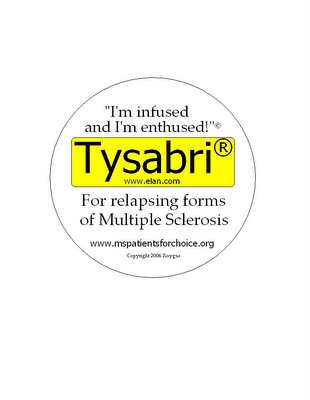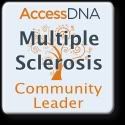My Tysabri Diary... New data released re: Tysabri...wooooooohoooooooo! Links are to the right, but in essence, here is the exciting news (beat this ABCRs, you can't, ha!) :
6 October 2006
New Pharmacoeconomic Data on TYSABRI® Demonstrate Significant Reduction in Steroid Use and Hospitalizations in Patients with Multiple Sclerosis
CAMBRIDGE, Mass. & DUBLIN, Ireland--(BUSINESS WIRE)--Oct. 6, 2006--Biogen Idec (NASDAQ: BIIB) and Elan Corporation, plc (NYSE: ELN) announced that data to be presented today at the Academy of Managed Care Pharmacy's (AMCP) 2006 Educational Conference in Chicago, IL show that in Phase III studies TYSABRI® (natalizumab) therapy significantly reduced corticosteroid use and hospitalizations, and increased the proportion of MS patients with no disease activity. Findings will also be presented that demonstrate the positive impact of TYSABRI on a number of health-related quality of life of measures (QoL) and the cost-effectiveness of MS therapies.
Data Demonstrates TYSABRI Reduced Corticosteroid Use, Hospitalizations and Increases the Proportion of Disease-Free Patients
Data presented today from the AFFIRM monotherapy study (two-year, randomized, multi-center, placebo-controlled, double-blind study of 942 patients conducted in 99 sites worldwide), showed the impact of TYSABRI on two pre-specified endpoints, the annualized rate of relapses requiring corticosteroid use and the annualized rate of hospitalizations due to MS. Data showed there was a 69% relative reduction in the annualized rate of relapses requiring steroids for patients treated with TYSABRI compared to those treated with placebo (0.133 in the TYSABRI group vs. 0.432 in the placebo group(p<0.001)).>Cost Effectiveness of MS Therapies
A model was constructed by Xcenda, formerly Applied Health Outcomes, to compare the cost per relapse avoided among the five approved disease-modifying MS therapies to treat relapsing forms of MS. Overall cost of therapy was calculated using the US wholesale acquisition drug cost, and costs associated with drug administration, patient monitoring and treatment of relapses. The costs associated with adverse events were not assessed as part of this model. Effectiveness was defined as the number of relapses avoided with treatment, which was calculated as the number of relapses for a non-treated population multiplied by published relapse rate reductions for the therapies.(1) Based on the model developed, the cost per relapse per year avoided was lowest for TYSABRI. The cost per relapse avoided for TYSABRI was between $12,730 and $23,274 lower than that of the other approved disease-modifying therapies.
Data Show TYSABRI Had Improvement in Quality of Life Assessments
Quality of Life (QoL) was assessed using three different measures, the Multiple Sclerosis Quality of Life Inventory (MSQLI), the Short Form-36 Health Survey (SF-36), which is a component of the MSQLI, and a Visual Analogue Scale (VAS). The MSQLI is an MS-specific battery of 10 scales that measure disease impact on QoL, including fatigue, pain, sexual function, bowel and bladder function, visual impairment, mental health and need for social support. The SF-36 is comprised of 36 questions designed to assess patients' physical and mental well-being. General well-being was also measured using the VAS.
In data presented today from the AFFIRM study, patients in the TYSABRI-treated group realized a significant improvement in physical measures of the SF-36 compared with a decline in the placebo-treated group (p=0.003). A significant improvement was also seen in the mental component of the SF-36 in patients treated with TYSABRI compared with a decline in the placebo-group (p=0.011). Significant benefits were also seen using the VAS (p=0.007).
About TYSABRI
In the US, TYSABRI is approved as a monotherapy treatment for relapsing forms of MS. TYSABRI increases the risk of progressive multifocal leukoencephalopathy (PML), an opportunistic viral infection of the brain that usually leads to death or severe disability. Patients should be monitored at regular intervals for any new or worsening signs or symptoms suggestive of PML. Because of the increased risk of PML, TYSABRI is generally recommended for patients who have had an inadequate response to, or are unable to tolerate, alternate MS therapies. It is available in the US only through a restricted distribution program called the TOUCH Prescribing Program. According to product labeling, after two years, TYSABRI treatment led to a 67% relative reduction (p<0.001)>concurrent immunosuppressants. Common adverse events reported in TYSABRI-treated patients include headache, fatigue, infusion reactions, urinary tract infections, joint and limb pain, lower respiratory infections, rash, gastroenteritis, abdominal discomfort, vaginitis, and diarrhea.
For more information about TYSABRI please visit www.tysabri.com, www.biogenidec.com or www.elan.com, or call 1-800-456-2255.
(1) The relapse reduction rates used were: TYSABRI was 67%, AVONEX (Interferon beta-1a IM) 32%, Betaseron(R) (Interferon beta-1b) 34%, Copaxone(R) (glatiramer acetate) 29%, and Rebif(R) (Interferon beta-1a SC) 32%.
SOURCE: Biogen Idec and Elan Corporation, plc
http://www.elan.com/News/full.asp?ID=913012
29 September 2006
New Data Presented at ECTRIMS Congress Show TYSABRI® Has Sustained Effect on Relapse Rate in Multiple Sclerosis Patients Treated for up to Three Years
ZUG, Switzerland and DUBLIN, Ireland--(BUSINESS WIRE)--Sept. 29, 2006--Biogen Idec (NASDAQ: BIIB) and Elan Corporation, plc (NYSE: ELN) announced today new data that show TYSABRI® (natalizumab) has a sustained effect on relapse rate in multiple sclerosis (MS) patients treated for up to three years. These data, presented at the 22nd Congress of the European Committee for Treatment and Research in Multiple Sclerosis (ECTRIMS) in Madrid, Spain, were part of long-term follow-up of TYSABRI clinical trial patients.
Patients who participated in the Phase III TYSABRI program were eligible to enroll in an open-label extension study that evaluated the therapy's long-term effects. Approximately 1,900 patients and over 200 sites worldwide participated in the extension study. Approximately 250 of these patients remained on TYSABRI monotherapy for nearly three years. The annualized relapse rate for these patients over the three-year period was 0.23, translating into an average of one relapse every 4.3 years. This was consistent with the 0.23 annualized relapse rate seen in the two-year AFFIRM study, which represented a 68% relative reduction when compared to the two-year placebo annualized relapse rate of 0.73, as published in the New England Journal of Medicine.
"Data from this long-term follow-up study show that TYSABRI has a sustained and compelling effect on relapse rates beyond two years of treatment. The efficacy benefit of TYSABRI when considered with the management of its known risks, offers an important therapeutic option for many patients living with the debilitating effects of MS," said Paul O'Connor, MD, St. Michael's Hospital, Toronto, Ontario, Canada, lead investigator of the extension study.
SOURCE: Biogen Idec and Elan Corporation, plc
http://www.elan.com/News/full.asp?ID=910437
28 September 2006
New Data on TYSABRI® Presented at ECTRIMS Congress Demonstrate Significant Improvement in Cognitive Function in Patients with Multiple Sclerosis
ZUG, Switzerland & DUBLIN, Ireland--(BUSINESS WIRE)--Sept. 28, 2006--Biogen Idec (NASDAQ: BIIB) and Elan Corporation, plc (NYSE: ELN) announced today that data from the Phase III AFFIRM monotherapy study demonstrated that treatment with TYSABRI® (natalizumab) significantly reduced the proportion of multiple sclerosis (MS) patients with worsening cognitive function as measured by the 3-second Paced Auditory Serial Addition Test (PASAT 3). These data, presented at the 22nd Congress of the European Committee for Treatment and Research in Multiple Sclerosis (ECTRIMS) in Madrid, Spain, contribute to existing data which demonstrate the overall therapeutic benefits of TYSABRI, including its significant impact on relapse reduction, disability progression and MRI measures. TYSABRI has demonstrated a 68% relative reduction in the annualized relapse rate compared to placebo and a 42% reduction in the relative risk of disability progression, as published in the New England Journal of Medicine.
Cognitive deficits are under-recognized and often misdiagnosed as depression, stress or other personality disorders. Studies have shown that approximately 43% to 65% of MS patients show measurable cognitive impairment in formal testing.(1) Cognitive dysfunction can occur early in MS and in patients with relatively mild physical disability. These deficits have a substantial effect on the daily functioning of patients. Areas impacted by cognitive dysfunction include memory, ability to process information and learning. (1),(2)
The AFFIRM study was a two-year, randomized, multi-center, placebo-controlled, double-blind study of 942 patients conducted in 99 sites worldwide, evaluating the effect of TYSABRI on the progression of disability and the rate of clinical relapses. Evaluating the effect of TYSABRI on cognitive function was a pre-specified endpoint of the AFFIRM study. Cognitive function was assessed using the 3-second Paced Auditory Serial Addition Test (PASAT 3), a test of auditory information processing. The study showed that treatment with TYSABRI reduced the risk of sustained cognitive worsening by 43% (p=0.013) when compared to placebo.
These cognitive function data complement the previously presented results of the AFFIRM study, which demonstrated a significant effect of TYSABRI on two-widely accepted health-related quality of life measures, the Short Form-36 Health Survey and the Visual Analogue Scale.
"Neuropsychological dysfunction significantly diminishes quality of life in many patients with multiple sclerosis, impacting everything from employment to social interaction. It is responsible for much hardship experienced by MS patients. The important positive effects of TYSABRI on cognitive functioning and quality of life add to the important benefits already reported on progression of disability and relapses. This provides strong evidence that observed neurologic benefits translate into important improvements as perceived by the patients," said Richard Rudick, MD, Director of the Mellen Center for Multiple Sclerosis Treatment and Research at the Cleveland Clinic.
(1) Rao SM, et al. Neurology. 1991;41:685-691
(2) Amato MP, et al. Arch Neurol. 1995;52:168-172
SOURCE: Biogen Idec and Elan Corporation, plc
http://www.elan.com/News/full.asp?ID=910099
TYSABRI Impacts Measures of Visual Function
In another analysis of the AFFIRM and SENTINEL data, patients treated with TYSABRI had a reduction in the risk of visual decline as measured by contrast testing compared to control. Loss of visual function is one of the most common causes of disability and lower QoL in MS patients. Low contrast letter acuity was a pre-specified endpoint in both studies. Recent studies have demonstrated that low contrast letter acuity (perception of light gray letters of progressively smaller size on a white background) is a more sensitive measure of visual dysfunction in MS than traditional measures.
TYSABRI Impacts Measures of Disability Progression
The primary efficacy endpoint of AFFIRM and SENTINEL at two years was the rate of disability progression sustained for three months as measured by the Expanded Disability Status Scale (EDSS). Additional measures of disability included the Multiple Sclerosis Functional Composite (MSFC), which consists of three tests that evaluate ambulation, upper extremity dexterity and cognitive function.
In AFFIRM, treatment with TYSABRI led to a 42% reduction in the risk of disability progression compared to placebo (p=0.0002). TYSABRI was also associated with significant delay in progressing to EDSS of 4.0 (ambulatory with moderate disability) and 6.0 (requiring a cane, crutch or brace). TYSABRI treatment also had a significant impact on all subscales of the MSFC, including the Paced Auditory Serial Addition Test (PASAT), a measure of cognitive function (p=0.005).
TYSABRI Phase III Safety
Progressive multifocal leukoencephalopathy (PML), a rare and potentially fatal, demyelinating disease of the central nervous system has been reported in patients receiving TYSABRI. PML occurred in two MS patients who had received TYSABRI with AVONEX and in one Crohn's disease patient who had recently received an immunosuppressant. In placebo-controlled trials of TYSABRI in MS, the incidence and rate of other serious infections were balanced between TYSABRI-treated patients and controls. Serious infections reported in TYSABRI-treated patients included pneumonia, urinary tract infection and appendicitis. The overall incidence and rate of common infections were also balanced between treatment groups. Commonly reported infections included upper respiratory tract infections, influenza, urinary tract infections, and gastroenteritis. Herpes infections were slightly more common in patients treated with TYSABRI. The incidence and rate of other serious and common adverse events in clinical trials were similarly balanced between treatment groups. Serious events that occurred in TYSABRI-treated patients included hypersensitivity reactions, including systemic reactions, depression, and cholelithiasis. Common adverse events reported include infusion reactions, headache, fatigue, and arthralgia.
SOURCE: Biogen Idec and Elan Corporation, plc
http://www.elan.com/News/full.asp?ID=840112
Go Tysabri!(((hugs)))Love, LaurenA very proud member of www.MSpatientsforchoice.org






